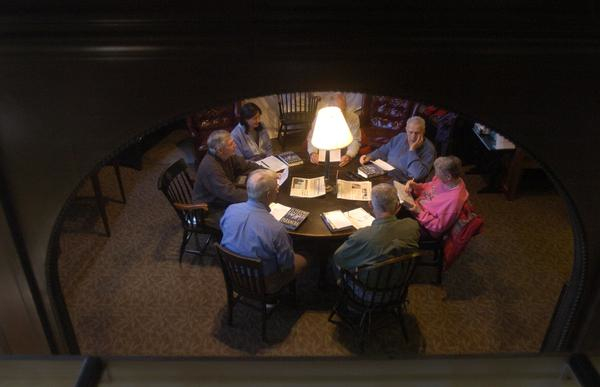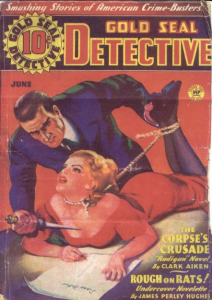It is normal for true mystery book fans to evaluate the same book differently – some will love it and some will say “yuck”! Why? There may be as many reasons as there are fans! But before getting into the reasons, let’s look at an example from a recent mystery book club meeting.

Our Mystery Book Club, January, 2008
Examples of the Reactions to One Book in a Small Group of Mystery Book Fans

Delightful Spread
Last month, we discussed Alex Kava’s book, Breaking Creed. And, from the position of the discussion leader, we had an ideal situation: a good spread of opinions. Here, at right, are the “scores” from 14 readers (including one score emailed from Florida!). It is “ideal” because it shows the presence of several people who really liked the book along with several who really disliked the book; that kind of spread has the potential for some good discussion (assuming both ends of the spread speak out). It will be more likely that the strong and weak points of the book will be brought out. Unfortunately, in this particular meeting, the lower half of the spread was more vocal. Those that said “90” were relatively quiet. I have to blame the discussion leader for this (me). Why is it “unfortunate”? Because whatever is said and heard (and not said and heard) affects the rest of the group. Some possibilities when one view dominates the discussion: (a) “That’s interesting, but I don’t agree.” (b) “That’s interesting, I think I might change my own score higher or lower.” (c) “That’s annoying. I feel put down by those whose view is different from mine.” It is fun when the reaction to the discussion is “a” or “b” – not so fun if the reaction (of course not verbalized) is “c”. And for the person whose reaction is “c” – it is made worse if they imagine they are alone. Generally, we don’t go around the circle and share scores until the end of the meeting, so if one end of the spectrum is quiet, they may (in the case of a “delightful spread” like this one) falsely feel isolated.

Skewed Spread
But what happens when the group’s reaction is heavily skewed in one direction or another? The example at right has happened in plenty of meetings – in this example, 2/3 of the group gave it a solid “B” or higher. And – only one or two people disliked the book. In this situation, the person who thought the book was a 65 is in fact alone. (Of course with a larger sample of readers, the spread of scores could be quite different!) But in this example, the the person with a score of 65 might be more inclined to be quiet. And that would be really unfortunate.
All meetings are more fun when oppositional views are heard, whatever they are. It is stimulating (i.e. fun) when readers give reasons why they like or dislike characters, plot, settings, or writing styles. It is thought-provioking (i.e. fun) when someone one compares the book with a previously read book. It is fun when members share that they have “discovered” a new author and plan to read more books by that author… or tell us about an additional book by the same author. It is fun when members occasionally say they will change their views and raise or lower their score after what they have heard.
But here is the most important part of this post: Mystery book club meetings are fun when we all accept the idea that people enjoy different kinds of books. With that in mind, it is completely OK when others have a score that is higher or lower than my own score, even if I seem to be the only one. Always remember, if a thousand people were rating the book, you might be in a minority but you would certainly not be alone.
So Why Do Mystery Book Fans Experience the Same Book Differently?
There are a variety of factors but most of them can be rolled up in an expression I used to tell my high school psychology students: Attitude affects perception. (Yes, I taught psychology for about 12 years – but that was a long time ago.)
By the word attitude, I mean the combination of emotions, values, and beliefs that we have regarding… well, anything and everything. Prejudice is an attitude. A prejudice is a preconceived opinion or belief that is not based on reason [but rather on emotion] nor on actual experience. But other attitudes we may have are based on experiences. In general, attitudes (whatever the source) are learned. And an attitude will color your perception of new persons, places, things, and…mystery books. Attitude affects perception.
So What Attitudes Are Especially Applicable to Mystery Book Fans
In many cases we are very aware of our attitudes; other times, not so much. Nevertheless, here are examples of varying attitudes that can affect what we like or don’t like in mystery books.
- Your political and religious beliefs (values). Some books have main characters (heroes) that have political or religious values different from yours. That may be OK unless the hero begins using rhetoric denigrating the views you hold dear. On the flip side, you may especially enjoy a hero who fights for causes you believe in against the villains you also oppose in real life. Again this may depend on the author’s tendency to let his/her own views seep (or flood) through.
- Your belief about male vs female authors. Some readers feel that female authors do a poor job getting inside the skin of their male characters, and the same with regard to male authors and their treatment of female characters. Some readers never discern a difference; at the other extreme, some readers will only read male authored mysteries (or vice versa).
- Your values:
- Foul language: Your tolerance for dialog with “dirty language” may vary from another reader.
- Profane language: Your tolerance for dialog with “profane language” (using God’s name in vain) may vary from another reader. And these two things about language may be at the same tolerance level in an individual … or may be miles apart: I can tolerate s–t and f–k but when God’s name is used in vain I cannot handle it.
- Hurting other people at all: Many variations — Hurting others in a book’s plot is OK…
- If it isn’t bloody and gory. Poison. but not machetes.
- If it doesn’t hurt. (Huh?!) Oh well. Or, perhaps- Murder is OK as long as it does not include torture.
- As long as the description of the actual bloody crime is brief and not very graphic. (“Very” can vary from one person to another!)
- As long as it isn’t an animal.
- As long as it isn’t a child.
- … ah, no. Murder is always upsetting in a mystery book. Hmm. Better stick to child mysteries then. Nancy Drew, for example, or Encyclopedia Brown. Or maybe crossword puzzles?
- Sexual scenes: Many variations — Descriptions of sexual activity in a book…
- Has no place at all.
- Should be alluded to in a general way only.
- Are OK if it is brief. For example, it can be acceptable to have one or two paragraphs in a book that describe sexual intimacy in detail (naming sexual organs and describing activity in relation thereto).
- Are OK -no matter how much of it in the book, anything goes- as long as it is germane to the character, the plot, or the setting and does not disturb the progress of the story.
- Types of plots or characters. “I don’t know why, I just don’t like it.”

Just Won’t Read It!
- Books with children or teenagers as main characters.
- Books with elders (seniors) as main characters.
- Books where the “bad guy” is the main character (protagonist).
- Books with supernatural elements in the plot.
- Books where the bad guy lives for another day. Example, the serial killer is not arrested or killed.
- Books where the main character (the hero, not the bad guy) lives for revenge; it is about vigilante justice in one way or another.
- Books where the plot resolution by the main character moves forward mostly by coincidence, luck, etc.
- Books with pets (or other animals) as central characters.
- Books with ordinary adults in ordinary vocations (not cops, lawyers, doctors) who solve crimes. Hardware store clerk, college teacher, rabbi, or home-schooling mother as a mystery book series character. In other words – cozies.
- Books that include descriptions of disease, creepy hospitals, or nasty doctors.
- Political thrillers.
- Espionage thrillers.
- Corporate thrillers.
- Military or war-time plots.
- High tech thrillers with a lot of descriptions high tech equipment, software, etc.
- Types of writing. “These things turn me off.”
- Too many short (or long) chapters.
- Too many pages. There may be a magic number that is different for different people.
- Too little (or too much) dialog.
- Too many characters in the first 3 chapters.
- No action in the first 1/3 of the book. Or variations on this, like, not enough chapters with action.
- The main character rehearses the clues too many times.
- Certain periods of history or certain parts of the world do not interest me no matter how good the plot is.
- The story line has too many flashbacks. (“Too many” is subjective and may depend on how skillfully the author implements the flashbacks.) Or some readers may simply dislike any story that has flashbacks.
The list of potential attitudes or circumstances that might affect your enjoyment of one or another type of mystery book is endless. And all of the above is a big reason why different people will rate the same book in completely different ways.
One More Thing …
A main value and benefit to reading a new author every month is to discover a few new authors every year that may provide you with dozens of books and hundred of hours of delight filled mystery book reading. To get that benefit may include a number of authors that you simply do not like that much.
Of course, another principle reason for participating in your local mystery book club is that it is just plain fun. I can say that I have developed many friendships through our own mystery book club, and this is a great source of personal satisfaction and pleasure.



Well done evaluation of the last Mystery Book Club’s recent ‘read and review’ ~ I agree there was more talk about the ‘negative’ than the positive despite the distribution of scores but that is how it goes sometimes ~
I did read the next two books and it was the characters and the dogs that I enjoyed and the plot leading to suspected research gone bad on ‘chemical warfare’ by the govt. Also this is one those authors that publishers are pushing as a series and end the book so you are left wanting to find out what happens and the solution is in the next book ~ Not a fan of this type of ‘marketing approach’ so will be rather cautious if there are more books to come???? ~
At any rate ~ enjoy this Mystery Book Club and the variety of opinions ~ so think too many rely on the ‘leader’ and not their own opinions ~ It is ‘okay to disagree’ ~ that is all I can say ~ Each one of us is unique so no surprise that some like or don’t like the book ~ World would be boring if we all agreed every time ~ Thanks, again, Dick for all you do and Thanks, Mike for the neat wine ~ See you soon ~
Carol McKenna (A Creative Harbor.com) recently posted..A SHUTTERBUG EXPLORES ~ 65
Tried to like this on FB and tried to post it on FB ~ indicated link may be broken?????
Carol McKenna (A Creative Harbor.com) recently posted..A SHUTTERBUG EXPLORES ~ 65
Thanks! And I have installed a better “share” plugin which is easier to set up and easier for readers to use. Ta-da!
Thanx for a well-thought out essay. I tend to be a consummate Libra – easily able to adjust my position on just about anything, when presented with reasonable argument.. (a.k.a. wishy-washy!) So I love to hear others’ opinions, and the diversity is what makes our book group the best.
I am in Florida until April, and have joined 2 book groups – a ‘reflective’ and a ‘speculative’ group. Both should be quite interesting. Happy Healthy New Year…..
Thanks for the comment, Joanne. Until April! Seems like that is longer than last year! You were missed at the last meeting; you always have some good things to say.
Hi Richard
Am longtime Spenser fan. Have talked with Ace Atkins. I want to visit Boston’s Spenser sites.
Couldn’t find direct contact info for you but would enjoy meeting you when I visit in May.
Yikes! I don’t know how I missed this comment so many months ago! Sorry!